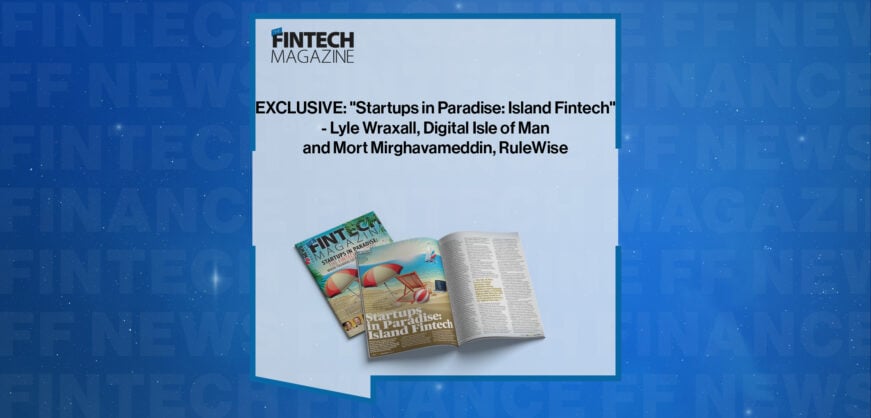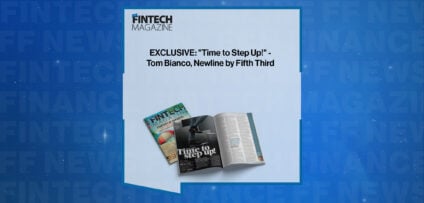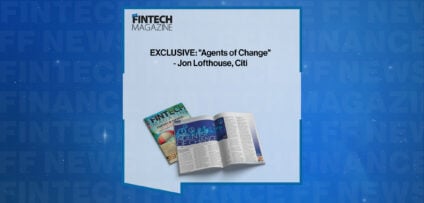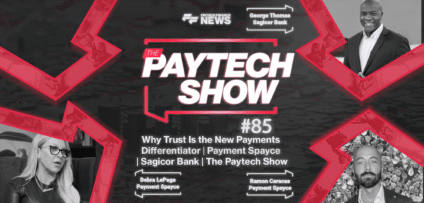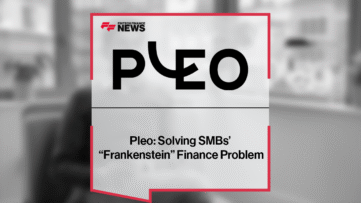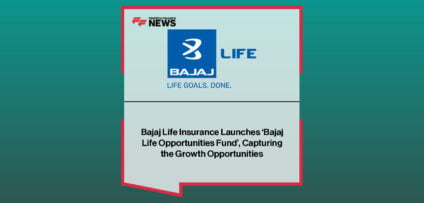Breaking News
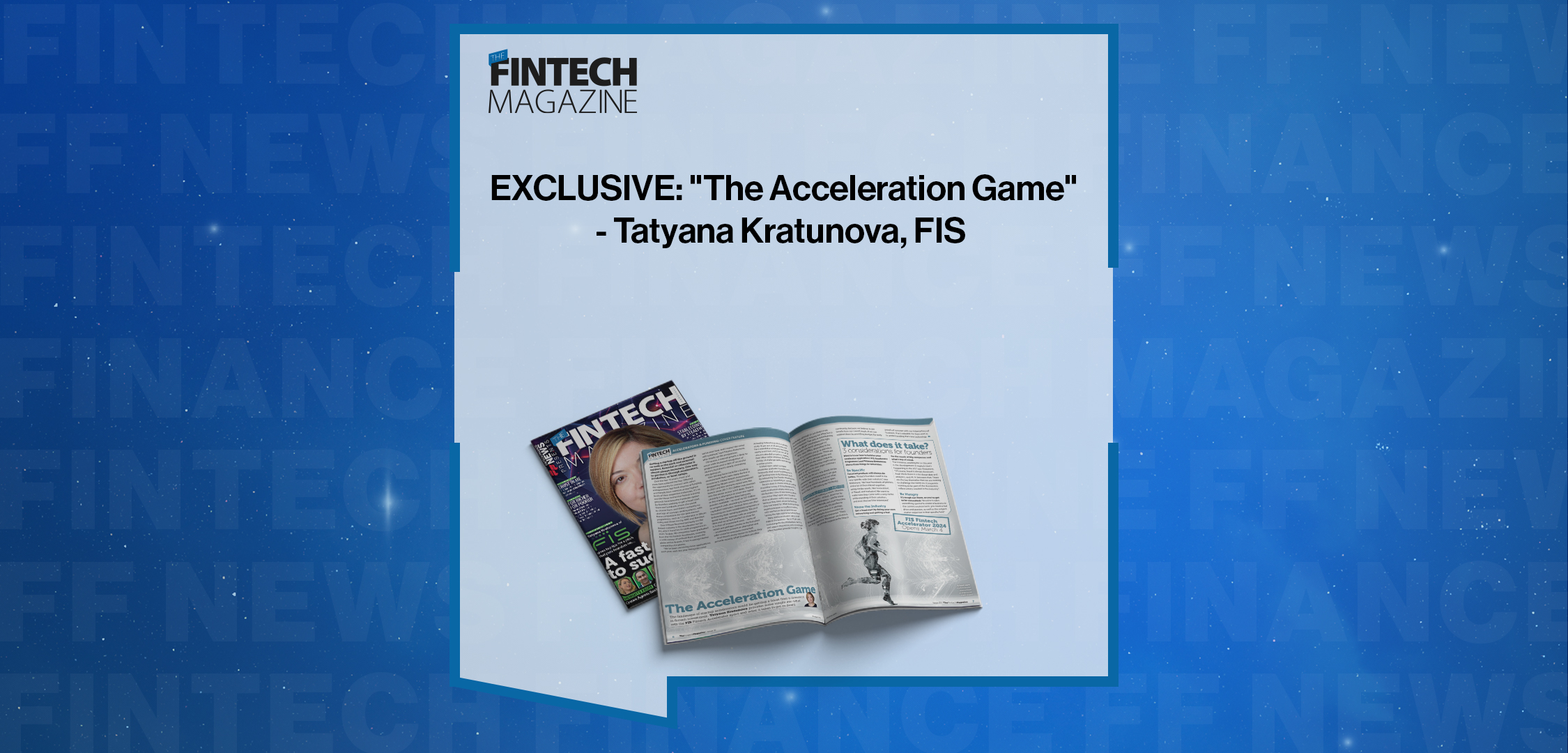
EXCLUSIVE: “The Acceleration Game” – Tatyana Kratunova, FIS in ‘The Fintech Magazine’
The landscape of startup accelerators could be getting a boost from a downturn in fintech investment. Tatyana Kratunova provides some insight into what sets the FIS Fintech Accelerator apart and what it takes to get on board
Getting a startup off the ground is no walk in the park and external support, financial or otherwise is almost always necessary. One way to get that is through accelerators, incubators, or boot camps. Over the last 10 years, more and more have entered the fray. Offering the opportunity to connect with other entrepreneurs, tap fresh sources of funding, and benefit from mentors at the highest levels of their respective industries, it’s no wonder these immersive fintech training grounds have become a popular option for founders seeking to get a head start.
There are hundreds across the world to choose from, and there’s certainly no shortage of startups seeking places, with fierce competition for the best-known programmes, such as Y Combinator in Silicon Valley and those run by AWS and Barclays. One of those focussed primarily on the fintech industry is the accelerator run by FIS, which launches its ninth programme in 2024.
To date, 80 companies have graduated from the FIS Fintech Accelerator, covering a wide variety of verticals from across the globe within fintech. It too is seeing intense competition for places.
“We’ve been receiving more applications each year, with last year being the most board we’ve ever had, and I expect the trend will continue,” says Tatyana Kratunova, who heads up the programme. Of course, a natural growth is likely to occur with increased recognition of programmes and a slate of successful alumni, but there’s clearly something else going on. One driving force could be a funding environment that’s seen steep decline in investment.
Global fintech investments dropped by 48 per cent in 2023, compared to 2022 and the amounts raised were the lowest since 2017; $51.2billion was invested into the sector across 3,973 deals. There is certainly a reluctance to issue new capital in this market, despite there being dry powder available – as much as $311billion in unspent cash, according to some venture capitalists’ estimates. Instead, firms are often focussing on more established companies or bolstering their existing portfolio.
This isn’t good news for startups with an unproven idea and no actual product to show for it. In lieu of investment sums – some of which are perhaps unwise in the first place – accelerators present an alternative and safer route for everyone concerned.And there’s every reason to believe they provide exactly what founders are after.
According to Beauhurst’s 2022 accelerator study, 40 per cent of UK companies who have attended an accelerator have raised equity investment, and 57 per cent of UK unicorns attended one prior to reaching their billion-dollar valuations. All three of the big UK challenger banks went through a similar process. A Sifted report, which surveyed accelerator graduates, found the most frequently cited reason for joining was ‘to get funding more easily, followed closely by networking’.
One founder described the experience as ‘networking on steroids’.
“FIS powers the financial solutions behind nearly every business in the world… we want to be able to share that network with businesses created in the last 18 to 24 months, because we believe that combination is invaluable for global innovation”
But you have to choose wisely. According to another survey of 20 top European VCs, many accelerators simply aren’t worth the founder’s time. Of the minority 28 per cent in the Sifted report who didn’t find their accelerator useful, many said it was because they didn’t secure the funding they had hoped for; others because they’d experienced poor or insufficient advice, with mentors on the programme not having the right experience to help them.
Many startup accelerators take a small stake in the business – five to 10 per cent – in exchange for the introductions, training and support they receive, and, according to Sifted, founders generally thought it a fair exchange, although it’s not always a win and could make a company less attractive to future investors. That said, an overwhelming majority (86 per cent) believed ‘the right accelerator was worth taking part in’.
“The value differs, depending on the type of accelerator you go to and who’s running it,” agrees Kratunova. “There are some where they will take equity, and they will give you the initial cheque to develop your idea, but they might not be able to get you to your target customers as quickly, for instance.”For FIS, the focus is very clearly on the connections and experience it can give startups. We dived in, to find out what sets the FIS Fintech Accelerator apart and what it’s like joining the ‘FIS family’.
WHAT’S IN IT FOR ME – AND FIS?
All investors are seeking a return. Likewise, most accelerators – at least, those run by commercial organisations – aim for some kind of mutual benefit, and most founders likely want to know why FIS decided to invest significant resources in startups.
“We’re looking to drive innovation in financial services,” says Kratunova. “That’s our first objective. The reason we do this is to provide support to the fintech community, because we believe it can benefit from our overall reach. If we can support them by providing budget for early proofs of concept with our internal lines of business, that’s valuable for them and us, in understanding that new technology.
“We want to make sure that we have a comprehensive overall view of how our customers can benefit from technology that we are partnering with, as well as our own technology that we’re developing.
“The accelerator programme supports fintechs, our banking and corporate customers, and other venture and investment firms, through the alumni that we’re creating. FIS uniquely sits in the centre of the ecosystem and, as such, we feel a responsibility to foster innovation and provide connection.”
So, what do founders and startups get by joining the FIS accelerator? The ubiquity of FIS within the financial ecosystem is probably what makes this accelerator one of the most powerful.
“We power the financial solutions behind nearly every business in the world,” says Kratunova .“We want to be able to share that network with businesses created in the last 18 to 24 months, because we believe that combination is invaluable for global innovation.
“We put startups in front of 30, 40 or 50 banks, and by the end they’ve exposed their knowledge and ideas to the different customers we have, and often realise their whole story needs to change, or their pricing needs to change, and are able to have those really prompt and honest discussions around, market fit, pricing, and due diligence. We’re able to open these really raw and honest conversations, that inform key decisions in the startup.”
WHAT’S THE DEAL?
So how does the process actually work? The idea is great in theory but what’s the commitment? For a lot of startup founders, time is not a resource they have a lot of, so deciding to dedicate some of it to a lengthy boot camp is a big decision to make. Applications for the FIS Fintech Accelerator programme open on March 4 this year, and 10 companies will make it through the selection process. They know whether they’ve made it by July 4. That’s followed by a four-week incubation period and the programme commences in early September.
The selection process is thorough. The FIS team meets ‘every single person who applies’, says Kratunova.
“I am a strong believer that a presentation cannot tell you a story in the same way as a founder and their passion for their company can. Through progressive discussions, we try to understand the key elements of their solution, as well as their founder story. Obviously, we want to make sure that there is a strong founder, and a strong story, so that we can get to that target vision.”
Selected founders get untapped access to FIS customers and have very direct conversations, she says.
“We also provide budget for the initial ideation. I think it’s important in the current market, to be able to start with an idea straight away because time is of the essence in that early ideation stage,” says Kratunova.
“Ultimately, the goal is to have a customer willing to get that initial solution, with the support of our business internally. That’s what I see as success for the Accelerator.”Of course, the hard work ‘starts after the accelerator, when you actually come to executing the idea’, she adds.
WHAT ARE THE RESULTS?
Kratunova says that typically graduate companies ‘have drastically improved their customer base through partnership, or have found different innovative ideas to drive forward in the market’.Success stories she highlights include Neural Payments, in the P2P space, TrustStamp, providing ability to validate onboarding of new and existing customers through biometrics, and Stratyfy with predictive model development and decision optimisation services to reduce risks. But it’s the overall impact that is most impressive.
“If I look at our cohort of alumni in the last eight years, our companies have raised more than $1.5billion in capital, which is incredible,” says Kratunova. “They have won nine Finovate awards in that timeframe, and four of our most recent companies have been named by GGV Capital U.S. in its 2024 Fintech Innovation 50 list of the most innovative fintech companies.”And that’s the type of company surely every fintech founder wants to keep.
What does it take? 3 considerations for founders
Want to know how to bolster your accelerator application? FIS Accelerator Programme Lead Tatyana Kratunova shares three things to remember.
Be Specific
Focussed products will always do better.
“Fintech founders need to be very specific with their solution,” says Kratunova. “We hear hundreds of pitches, and a lot of them blend together, using similar words, like ‘innovation’, or ‘fraud’, and ‘exclusive’. We want to make sure they come with a very niche understanding of their solution, and trust that we’ll be interested.”
Know the Industry
Get a head start by doing your own networking and getting a feel for the needs of big companies and what’s top of mind.
“For instance, exciting for us this year is the development in regtech that’s happening in the US,” says Kratunova. “Of course, fraud is always dominant. And I think there is a lot about data and analytics, and AI, in between that. Those are the key thematics that we are looking to challenge the norm on. Companies wanting to be part of the Accelerator, reflect what’s needed in the industry”.
Be Hungry
It’s tough out there, so you’ve got to be committed.
“Because it takes something special to create a business in the current environment, you need a real drive and passion, as well as the subject-matter expertise in that specific field.”
Luminous Alumni
FIS has developed a reputation as a go-to accelerator. Here are three of the most successful startups to have come through the programme
Neural Payments
Ohio-based Neural Payments was founded in 2018 and provides payment services such as digital adoption, lower transaction costs and simplifying tech integrations. It was part of the 2022 cohort and has raised $11.58million.
TruStamp
Part of the 2020 programme, TrustStamp is an AI-powered identity and fraud mitigation solution, using biometric onboarding. Founded in 2016, the Atlanta-based company went public in 2020 and is now listed on Nasdaq (Nasdaq: IDAI).
Stratyfy
Founded 2017 in New York, Stratyfy was one of the FIS Fintech Acclerator’s 2020 cohort of alumni. Its predictive model development and decision optimisation services are designed to reduce operational and financial risks by combining human expertise with algorithmic fairness. To date, the company has raised a total of $10.16million
-
- Applications for the 2024 FIS Fintech Accelerator cohort opens on March 4. You can apply via the FIS Fintech Accelerator webpage https://www.fisglobal.com/fis-fintech-accelerator
This article was published in The Fintech Magazine Issue 31, Page 6-8
People In This Post
Companies In This Post
- E-commerce Berlin Expo 2026 Jubilee Edition Reveals the AI future of Digital Commerce Read more
- Why Trust Is the New Payments Differentiator | Payment Spayce | Sagicor Bank | The Paytech Show #85 Read more
- E-commerce Germany Awards 2026 Reveals Industry Leaders and Best Innovators Read more
- Pleo: Solving SMBs’ “Frankenstein” Finance Problem Read more
- Bajaj Life Insurance Launches ‘Bajaj Life Opportunities Fund’, Capturing the Growth Opportunities Read more






